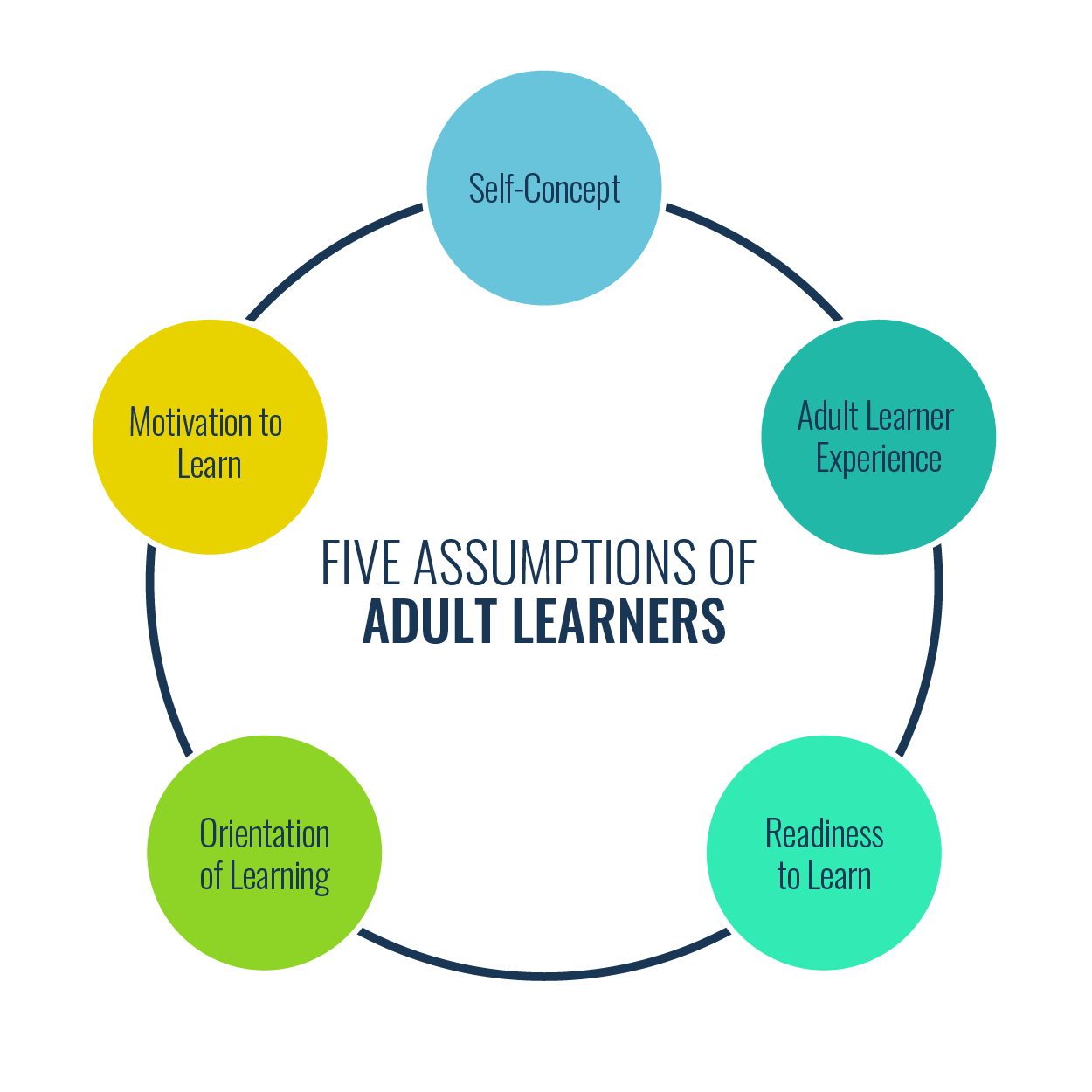
[ad_1]
As an grownup, studying can really feel like a problem. After all, we could also be burdened with an absence of time, self-doubt, monetary boundaries, declining neuroplasticity or insufficient assist. It appears honest to say that studying turns into a completely completely different course of as we get older.

Even nonetheless, earlier than World War II, theorists virtually at all times targeted on learning the way in which youngsters study. As a end result, there was a lack of awareness about how the training course of differs between adults and kids.
Luckily, Malcolm Knowles modified the narrative. His Adult Learning Theory, also called andragogy, highlights the distinct methods grownup learners differ from youthful learners. This makes it a must-know principle for any L&D skilled crafting coaching for mature college students.
In this text, we’ll delve into the basics of andragogy and present you tips on how to put its rules into observe in your coaching programme. But first, let’s begin by exploring the daddy of andragogy!
Introduction to Malcolm Knowles
Malcolm S. Knowles (1913-1997) was a famend American educator. He was one of many central figures in grownup training within the second half of the twentieth century.
His work stays related. In truth, Knowles popularised the time period andragogy, and his Adult Learning Theory nonetheless has a spot in right now’s L&D world. These phrases are generally used interchangeably.
Initially raised in Montana, Knowles gained a scholarship to Harvard, the place he studied philosophy, literature, historical past, political science, ethics and worldwide regulation.
At first, Knowles aspired to a profession within the Foreign Service. However, fortunately for the L&D business, there was a three-year await entry, and Knowles joined the National Youth Administration as a substitute.
His job concerned evaluating what expertise and data native employers have been searching for. Knowles then established programs to show these expertise to make sure younger folks received recruited into these roles. This is the place his ardour for grownup studying started.
During this time, Knowles met Eduard Lindeman, one other nice thoughts within the grownup training house. Lindeman mentored Knowles till he joined Boston University in 1959. He labored as an affiliate professor of grownup training.
During his years at Boston University, Knowles produced his key texts: The Modern Practice of Adult Education (1970) and The Adult Learner (1973). Later on, he up to date his key texts and revealed a brand new e book on Self-directed Learning in 1975.
These texts are the idea for Adult Learning Theory as we all know it right now. Let’s take a look!
What Is Adult Learning Theory?
In 1980, Malcolm Knowles unlocked the key to efficient grownup studying along with his groundbreaking Adult Learning Theory. This progressive method acknowledges the distinct methods adults deal with training and the instructing strategies and kinds work greatest for them.
Initially, Knowles solely made 4 assumptions in regards to the traits of grownup learners. These assumptions give attention to self-direction, the training expertise, readiness to study and studying orientation.
He added the fifth assumption 4 years later, in 1984. This fifth assumption considers grownup learners’ motivation to study. These 5 assumptions kind the idea as we all know it right now.
But Knowles didn’t cease there. He additionally laid out 4 rules of andragogy to information educators of their instructing. The time period andragogy, coming from the Greek phrase ‘man-leading,’ stands in distinction to pedagogy which suggests ‘child-leading’.
Let’s discover his 5 assumptions and the 4 rules of andragogy in additional element.
Five Assumptions of Adult Learners
To perceive the wants of grownup learners, Knowles recognized 5 defining traits that set them aside from their youthful counterparts. These assumptions kind the spine of his Adult Learning Theory and provide perception into how greatest to interact and educate mature college students.
So, what are these 5 assumptions? Let’s discover how incorporating them into your coaching programme will help unlock the potential of grownup learners.

Assumption #1: Self-Concept
The first assumption, referred to as Self-Concept, is that adults turn into extra unbiased as they transfer by life. Rather than being dependent personalities like youngsters, we turn into self-directed people as we get older.
As a end result, adults carry the abilities and data wanted to study and perceive independently. According to Knowles, which means grownup learners want a extra self-directed method to studying fairly than instructor-led coaching.
This is a giant a part of why studying know-how platforms, like studying administration programs (LMS), have grown to be so well-liked in company coaching. After all, these instruments allow learners to take possession of their studying journey. Typically, learners have a say in what they study, how they study it, and when.
As an L&D skilled, it’s best to give attention to creating studying experiences that provide most autonomy. Ideally, your studying platform ought to information and assist your customers by their studying course of. As such, you want to make sure you present the instruments and sources your learners must study on their very own phrases.
Exploring matters autonomously is an glorious approach for grownup learners to accumulate and construct new info upon their earlier data. In truth, the training expertise turns into extra significant if they’ve the prospect to discover and apply the subject in several methods.
To accomplish that, your studying instruments want to permit them to discover matters from numerous viewpoints. This may come within the type of unbiased examine, group discussions, simulations, eventualities or studying video games. These options assist your learners to understand and apply the knowledge efficiently.
However, maybe much more importantly, your content material needs to be open entry for all. While it’s time to throw mounted and inflexible curricula out of the window, sign-posting and suggestions are nonetheless useful methods to information learners in direction of related content material.
Assumption #2: Adult Learner Experience
The second assumption, titled Adult Learner Experience, means that adults have huge earlier expertise from which they will draw data and references into the training course of.
Naturally, youngsters steadily study issues for the primary time with out earlier expertise. Adult learners, alternatively, deliver their previous training, coaching, jobs and life occasions into the training expertise.
This assumption offers important steerage in terms of planning your coaching programmes. After all, you shouldn’t assume your learners are learners with out first understanding what data and expertise they have already got.
To comprehend their present capabilities, it’s best to begin by conducting a coaching wants evaluation (TNA). This will make it easier to to design a programme that’s related and difficult sufficient to maintain your learners motivated.
Even if you’re discussing new matters and introducing new phrases, grownup learners typically have expertise and former experiences they will use to counterpoint the training course of.
This type of elaboration of earlier data is one in every of our favorite research-backed studying methods! After all, integrating earlier data is an efficient strategy to improve the training course of and enhance data retention.
You can accomplish that by creating personalised studying pathways that information your learners by their coaching programme. As they progress, your studying supplies ought to go into extra element and turn into tougher. After all, your learners ought to now have the abilities to know extra superior ideas.
Similarly, it’s best to embody a spread of tutorial design fashions and approaches to attraction to your various learners. After all, all of them have distinctive backgrounds and experiences.
Assumption #3: Readiness to Learn
The third assumption, Readiness to Learn, means that adults need to study and are ready to take action when there’s a good purpose. In different phrases, as we mature, we turn into extra desirous to study issues that assist us obtain our objectives or accomplish related duties.
Unlike youngsters, grownup learners are sometimes extra selective with what info they soak up. As such, they care in regards to the ‘why’ or WIIFM (what’s in it for me) behind studying.
They need to understand how their studying programme will assist them. In truth, they could ask questions like ‘How will this help me or my career?’ or ‘Is this training relevant to my skills gaps?’.
This is what makes communication important. In each stage of your coaching programme, you want to make it clear what your learners are taking away from the course and why it issues to them.
You must also preserve relevancy by implementing real-world examples and eventualities and alternatives to use data.
Similarly, you should use collaboration instruments and social studying options to tie studying to social growth. After all, the extra they will get out of coaching, the extra probably they’re to interact with it.
Assumption #4: Orientation of Learning
The fourth assumption, Orientation of Learning, means that grownup learners need their studying to be truly relevant to their on a regular basis lives.
Knowles explains that as an individual matures, their perspective adjustments. They transfer from specializing in subject-centeredness to problem-centeredness. Ultimately, adults need to study sensible expertise that assist them remedy issues they’re encountering of their lives.
To have the option to take action, adults transfer away from merely figuring out a few idea or time period in direction of having the ability to apply new info in the true world. This focuses on constructing tangible data that contributes to problem-solving.
Throughout your studying programme, it’s best to emphasise how the subject material helps your learners to resolve issues. Real-life examples are additionally a superb strategy to spotlight how learners in related positions have been capable of apply their data.
In addition, it’s best to implement scenario-based studying. It’s a superb strategy to train about problem-solving in a protected atmosphere. In addition, it’s an attractive studying expertise that helps grownup learners to carry out higher of their roles.
Assumption #5: Motivation to Learn
The final assumption is known as Motivation to Learn. This assumption means that as people get older, their motivation to study turns into inside.
As youngsters, we sometimes study due to exterior elements, similar to mother and father and lecturers. When we mature in life, our motivations change. Adults need to study for their very own causes, like progressing of their careers, getting a pay rise or boosting their vanity.
These inside motivators are particular person to every learner. As such, it’s important that you just take your time to know what motivates your viewers.
After all, in case your learners should not motivated to finish their coaching, they received’t interact with it. As such, you want to implement these motivators as part of your communication plan and coaching programme.
Again, it’s best to guarantee selection in your coaching programs, matters and content material varieties. In addition, ensure your coaching initiatives are complete. This lets you cater to the completely different motivators your learners could have.
Ultimately, understanding what motivates your learners lets you guarantee there’s a legitimate purpose behind each on-line studying course, module and have. You want to focus on how your coaching programme will profit your learners to provide one of the best outcomes.
Four Principles of Andragogy
When Knowles added his fifth assumption in 1984, he additionally instructed 4 rules that he extrapolated from his assumptions.
These 4 rules describe how Adult Learning Theory will be utilized right into a coaching initiative. After all, in keeping with the idea, adults have a definite method to training.
As such, these rules provide a roadmap for L&D professionals trying to create programmes that resonate with mature college students. Let’s take a quick look!
1. Involvement
The first precept means that grownup learners must be concerned within the planning and analysis course of. These self-directed people need to management the what, when and the way of the training course of.
2. Past Experiences
According to Knowles, our earlier experiences, successes, and errors present the idea for our future studying actions. After all, this helps them so as to add higher context to the brand new info they’re studying.
3. Relevant Topics
Perhaps unsurprisingly, the third precept means that grownup learners are most all for studying about matters which have rapid relevance to them.
4. Problem-Centric Learning
As explored, grownup studying is often problem-solving in nature. As such, merely offering memorising alternatives isn’t sufficient. Adult learners need to use reasoning to absorb the knowledge they’re introduced with.
Criticism of the Adult Learning Theory
While Adult Learning Theory has gained recognition, it has additionally been criticised for its idealised view of adults as self-directed learners.
While that is true for some, it’s additionally doable that adults don’t take initiative of their studying. This signifies that they don’t essentially need to management their studying journey, however fairly want to study by steerage.
Let’s use a presentation for example. The principle assumes that every grownup learner will select a related and helpful subject, do job out of delight and have the abilities to create a profitable presentation.
However, there isn’t a assure that these three assumptions maintain simply because the learner is an grownup. In addition, there are grownup learners who worth classroom coaching. These people received’t discover as a lot worth in self-directed studying.
Cultural variations can even affect grownup studying preferences. This makes the idea’s reliance on self-directedness problematic. Therefore, merely counting on the truth that adults are self-directed learners could cause extra hurt than good.
With this critique in thoughts, let’s discover if Adult Learning Theory remains to be related in L&D!
Is Knowles’ Theory Still Relevant?
Despite criticism, Adult Learning Theory can provide helpful recommendation on tips on how to create profitable coaching programmes for grownup learners. In truth, it may assist L&D professionals to roll-out coaching initiatives that meet the wants of their trendy learners.
Rather than pouring studying into the heads of your college students, it guides you to extend autonomy in your coaching. After all, making use of pedagogical principle signifies that learners are depending on the instructor for steerage and acquisition of data.
 In truth, merely understanding the variations between pedagogical and andragogical approaches could make or break your grownup coaching programme. In a classroom full of execs, pedagogy can result in disengaged and uninterested learners.
In truth, merely understanding the variations between pedagogical and andragogical approaches could make or break your grownup coaching programme. In a classroom full of execs, pedagogy can result in disengaged and uninterested learners.
Adults come to the desk with completely different motivators. Andragogy conjures up L&D professionals to attach studying experiences to what grownup learners already know.
Considering this, we argue that Adult Learning Theory nonetheless has its place within the L&D business. However, similar to with every other principle, you want to analyse your learner viewers to see what works and what doesn’t.
After all, all learners have completely different studying wants, preferences, kinds and motivators. Simply counting on one method or principle isn’t sufficient to fulfill the wants of all of your distinctive learners.
Final Words
Malcolm Knowles’ Adult Learning Theory revolutionised our understanding and method to grownup training by providing 5 key assumptions and 4 rules for L&D professionals.
With a give attention to grownup learners’ distinct motivators, self-awareness, and readiness, Knowles’ principle requires extra unbiased studying alternatives.
While the idea has confronted some criticism, understanding andragogy is essential for L&D professionals to create partaking coaching that resonates with trendy learners.
Embrace the facility of grownup studying and elevate your worker expertise. Download your free guidebook to the trendy learner by clicking the hyperlink under!
[ad_2]

